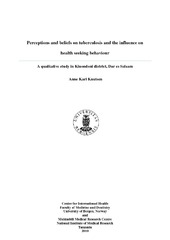| dc.contributor.author | Knutsen, Anne Kari | en_US |
| dc.date.accessioned | 2014-07-16T11:13:22Z | |
| dc.date.available | 2014-07-16T11:13:22Z | |
| dc.date.issued | 2010-05-17 | eng |
| dc.date.submitted | 2010-05-17 | eng |
| dc.identifier.uri | https://hdl.handle.net/1956/8169 | |
| dc.description.abstract | Background and goal Tuberculosis (TB) is one of the major health problems in the world. Early passive case detection and high treatment compliance is important for obtaining a successful TB control. One of the factors early case detection relies on is the human factor. The suspected TB case needs to recognize symptoms of TB and value them serious enough to report at a professional health facility. Cough for more than two weeks is considered to be TB suspect. The main goal of early case detection is to prevent continuously transmittance of Mycobacterium Tuberculosis in the communities. The detection rate of new smear positive TB in Tanzania is below 50%. This study aims to contribute to the understanding of the human factor in health seeking behaviour. The main objective is to study whether knowledge, beliefs and perceptions of TB can influence the health seeking behaviour in a community in Dar es Salaam, Tanzania. Method of investigation This study had an exploratory qualitative design. Focus Group Discussions and Individual Interviews were used as methods for data collection in three study sites in Kinondoni Municipality from June to September, 2009. Nine FGDs and 15 INIs were conducted with total of 70 informants. The data were analyzed by using Systematic Text Condensation. Ethical clearance was granted from Medical Research Coordinating Committee in Tanzania and Regional Ethical Committee of Western Norway. Principal results of the investigation TB is perceived as a normal, common and treatable disease. The main symptoms are cough and fever. TB is believed to be the same as HIV / AIDS. There is a fear of seeking professional care for TB since the communities know that a TB patient will be assessed for HIV. There is a lack of knowledge and a misconception around the causality of TB. TB is believed to be caused by hard work and dust. It can also be caused by bad spirits, bewitchments or inflicted upon one by God. TB caused by spirits or bewitchments can only be treated by prayers or traditional healers. Traditional healers believe injections can kill a patient treated at hospital. Hospital is the most preferred site of seeking care within the professional sector. Some would choose the folk sector as a first choice of care or as a second choice if hospital treatment fails. The TB patient would not be treated differently by his family, but within the community he would be stigmatized and face isolation. Low levels of understanding of TB were connected to seeking care at the folk sector. Principal conclusions suggested by the results The human factor is important for TB control. It would be useful for decision makers to consider the communities' health beliefs when developing educational and control plans for TB. The believed normality and commonality of the disease should be addressed in the plan work for case finding. More research is needed to assess the target populations' health beliefs. | en_US |
| dc.format.extent | 751117 bytes | eng |
| dc.format.mimetype | application/pdf | eng |
| dc.language.iso | eng | eng |
| dc.publisher | The University of Bergen | eng |
| dc.subject | Tuberculosis | eng |
| dc.subject | Tuberkulose | eng |
| dc.subject | TB | eng |
| dc.subject | Health seeking behaviour | eng |
| dc.subject | Health behaviour | eng |
| dc.subject | Tanzania | eng |
| dc.subject.mesh | Health Behavior | eng |
| dc.subject.mesh | Tuberculosis | eng |
| dc.subject.mesh | Tanzania | eng |
| dc.title | Perceptions and beliefs on tuberculosis and the influence on health seeking behaviour. A qualitative study in Kinondoni district, Dar es Salaam. | en_US |
| dc.type | Master thesis | |
| dc.rights.holder | Copyright the author. All rights reserved | |
| dc.description.degree | Master of philosophy in international health | |
| dc.description.localcode | MAMD-INTH | |
| dc.description.localcode | INTH395 | |
| dc.subject.nus | 769913 | eng |
| fs.subjectcode | INTH395 | |
